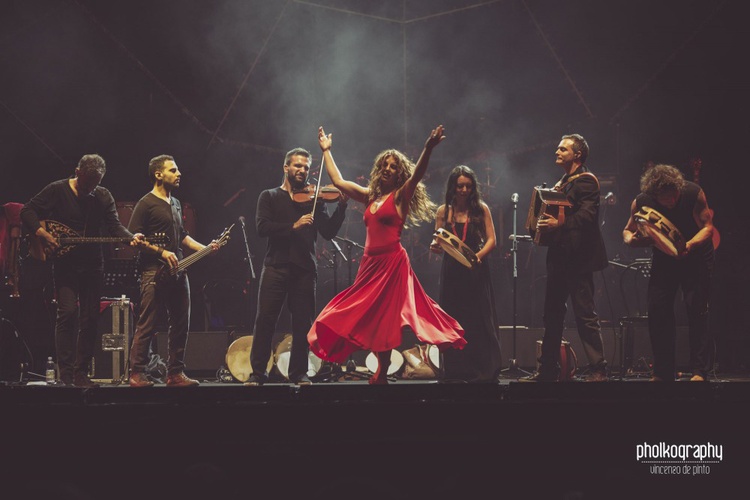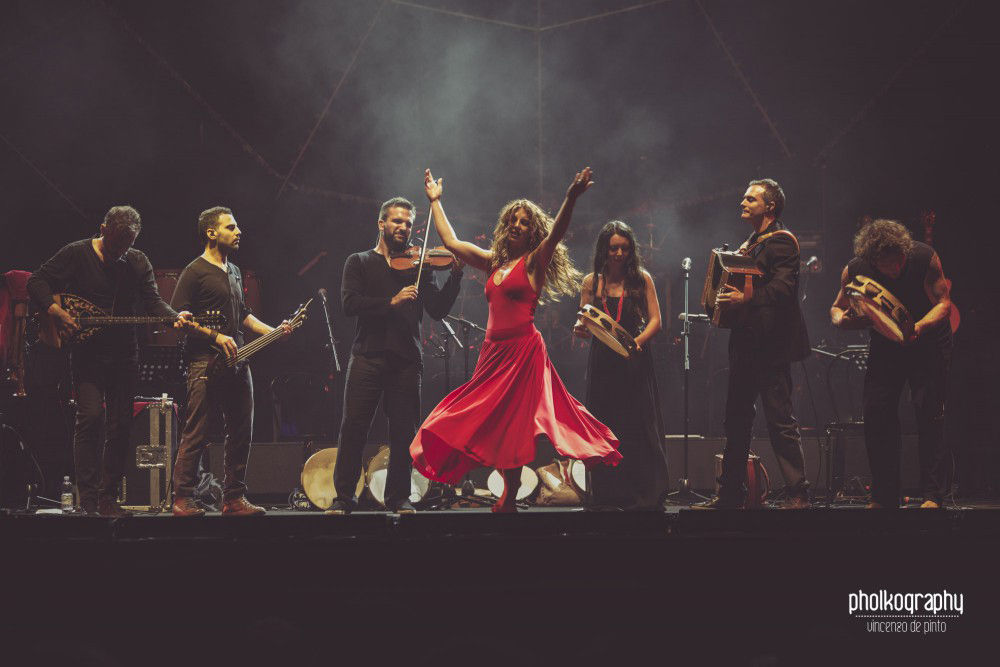Hailing from Salento, in the heel of the Italian boot, Canzoniere Grecanico Salentino (CGS) celebrates traditional southern Italian music.
Leadership of the ensemble was handed down to Durante by his acclaimed father Daniele, in 2007.
Since Durante was handed the reins, the group has released four critically-acclaimed albums and performed in every corner of the globe, collaborating with esteemed international artists.
Most recently, the band was crowned Best Group at the 2018 Songlines Music Awards in London.
Durante was more than prepared to take on the role of the group’s leader: in the 2010-11 edition of the Notte della Taranta, he was named musical assistant of famous pianist Ludovico Einaudi, at just 26 years of age.
He also toured internationally with Einaudi, performing in some of the world’s most prestigious theatres.
However, Durante’s musical journey began much earlier, and he was born with music running through his veins.
In 1975, Daniele Durante was summoned by Rina Durante, his father’s cousin who was a renowned writer and activist in Puglia.
The formation of CGS was the result of an attempt to research and document the region’s subaltern culture.
“They wanted to revive popular tradition, not out of nostalgia, but in contrast to commercial culture,” Durante said.
“The intention was to offer a glance into the past as a way of moving towards the future with more knowledge.”
Since its inception, the group’s philosophy has been “to study tradition with love and care, metabolise the language and use it to speak about the present”, a message which is summarised perfectly in the cover of its most recent album, Canzoniere (2017), which depicts a Coca Cola bottle filled with tomato passata.
The reference to the US and its iconic beverage is almost obligatory, seeing as the album is the product of intense exchanges between Lecce and New York and features collaborations with well-known writers and producers on the American music scene.
Durante also mentions the music theory of David Byrne from Talking Heads when describing his method of composing, highlighting the importance of a formal structure with which to mould artistic inspiration, which, in the case of CGS, is in the humus of the traditional pizzica salentina.
The mixture of modern melodies and folk music involves the wise use of both instruments typical of the pizzica – such as tambourines, recorders, diatonic accordions, harmonicas, violins and Italian bagpipes – and electronic instruments such as the Moog synthesiser, along with traditional Greek instruments like the bouzouki.
When asked what made him believe that traditional southern Italian music could be understood and appreciated outside of his homeland, Durante pointed towards the ancient elements of song and dance.
“It’s an unwritten invitation to actively participate in the performance, which allows people to overcome both language and temporal barriers,” he said.
While the band’s tracks certainly encourage people to get up and move, reviews of its recent albums suggest they are just as good to sit and listen to.
“It’s true that our roots are planted deep in the soil of our territory,” Durante said.
“However, the characteristics of our music resemble those of modern music, in terms of content, themes and effectiveness.”
This isn’t CGS’ first trip to Australia, and Durante didn’t fail to mention the significance of encounters with Italian communities abroad.
“It’s important for us because it allows us to meet people who have a heritage frozen in time, because once you leave your homeland, your traditions don’t change or evolve as naturally,” he explained.
However, the first generation of Italians to migrate from Puglia to Australia didn’t have a strong knowledge of their region’s traditional music.
“The pizzica really boomed in the late ’90s, so it was a real rediscovery for them,” Durante said.
The seven-piece band will grace the stage of the Thornbury Theatre tonight for an exhilarating performance.
The entire ensemble has made it to Melbourne for the event: Durante (vocals, frame drums, violin), Alessia Tondo (vocals, percussion), Giulio Bianco (Italian bagpipes, recorders, harmonica), Massimiliano Morabito (diatonic accordion), Emanuele Licci (vocals, bouzouki, guitar), Giancarlo Paglialunga (vocals, tamburrieddhu) and, last but not least, Silvia Perrone (dancer).
“Silvia’s role is fundamental, because the pizzica is both song and dance together,” Durante said.
Organised with the support of Puglia Sounds, the concert is the highlight event of the Melbourne Taranta Festival, a five-day celebration featuring meetings, workshops and concerts.
Running from March 13 to 17, the festival promotes contemporary Italian and Mediterranean folk music and culture.
Sponsored by the Federazione Pugliese d’Australia and under the artistic direction of Salvatore Rossano, this is the festival’s first edition.
For more information and tickets visit the Melbourne Taranta Festival’s website.












